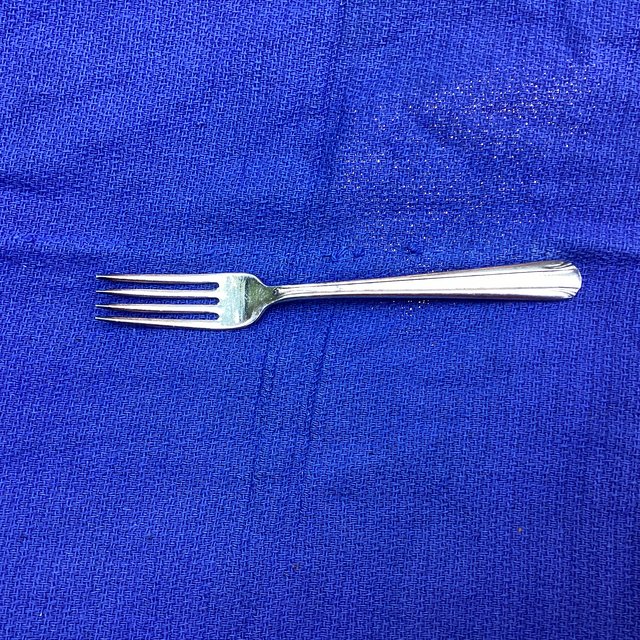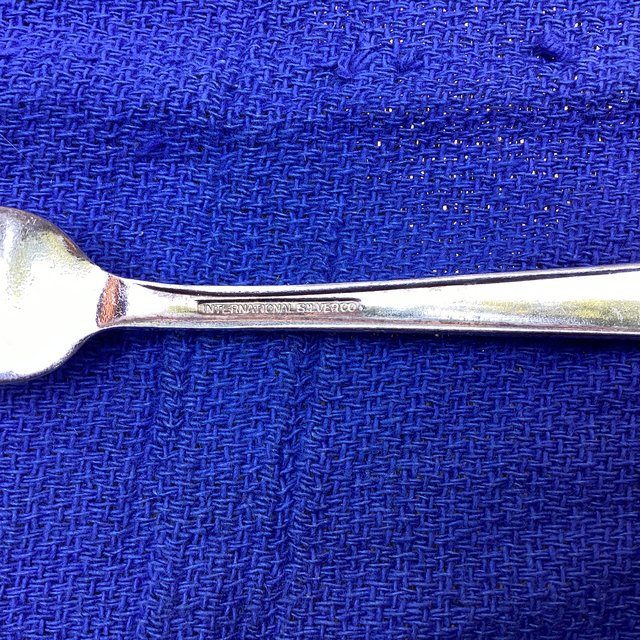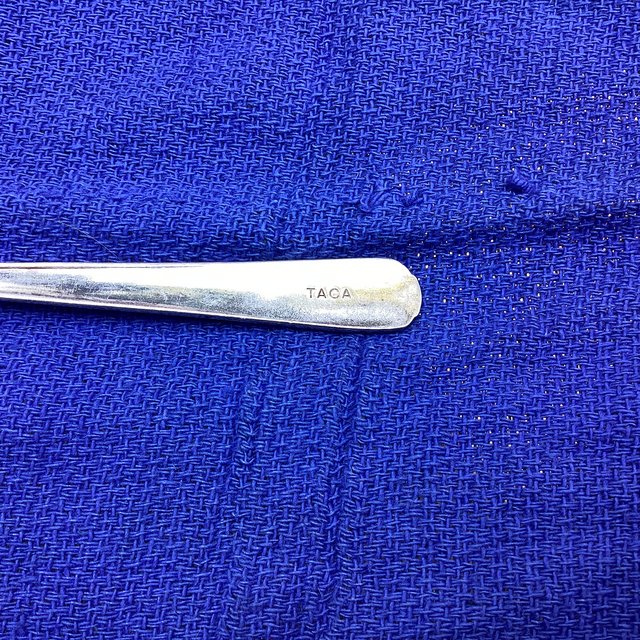Restaurantware Suppliers In Silverwares
Re: Restaurantware Suppliers In Silverwares
Legion Utensils is primarily known for stainless steel tablewares used in the restaurant industry. They reportedly began in 1937, but the Legion "L" Utensils trademark was filled in 1944, approved in 1945, and dates first use to late 1943 (apparently for use on weapons related materials). The original company was transformed around 1988 and the mark has been out of use. This mark was also applied to silverplated holloware (seen on base) crafted in Italy by Sambonet (name mark on handle). So there may also be flatwares yet to be documented. Legion is known to occasionally mark steel wares with user names or logos, so it is also possible that some of the Sambonet wares could be so marked. [Legion claims to have been a leader in pioneering the application of silverplate to stainless steel. Not a very clear statement, but one should not assume that all plated items supplied by Legion came from Sambonet.]
Additionally, Oneida has had items produced by Sambonet which are bottom-marked with the Oneida name above Sambonet Italy. More importantly, these may also include a set of three stars in the maker markings which are likewise found on the Legion items. [The reason it not clear, however triple-plate was a common standard for typical "better-grade" commercial application since the latter half of the 19th century, not to say it is the "best-grade" available.]
Additionally, Oneida has had items produced by Sambonet which are bottom-marked with the Oneida name above Sambonet Italy. More importantly, these may also include a set of three stars in the maker markings which are likewise found on the Legion items. [The reason it not clear, however triple-plate was a common standard for typical "better-grade" commercial application since the latter half of the 19th century, not to say it is the "best-grade" available.]
Re: Restaurantware Suppliers In Silverwares

Legion Utensils Corporation - New York - 1944

Trev.
Re: Restaurantware Suppliers In Silverwares
On 30 November 1921, commercial industry news notice of International Silver Company being granted a trademark for silverplated wares: https://books.google.com/books?id=xwIcA ... ed&f=false
Lost the link and can't seem to find it again, but, Federal regulators apparently went after Diamond Silver Company for useage in trade of the word silverplate/silverplated due to the conclusion that there was no silver whatsoever in their products! It is interesting that they used advertising catches like "Diamond Plate" or marks like E.P.N.S. (electroplated with what?) but seem to avoid the term silverplate...and yet they were constantly listed among plated ware suppliers in sources like hardware catalogues. This may need more investigation.
Lost the link and can't seem to find it again, but, Federal regulators apparently went after Diamond Silver Company for useage in trade of the word silverplate/silverplated due to the conclusion that there was no silver whatsoever in their products! It is interesting that they used advertising catches like "Diamond Plate" or marks like E.P.N.S. (electroplated with what?) but seem to avoid the term silverplate...and yet they were constantly listed among plated ware suppliers in sources like hardware catalogues. This may need more investigation.
Re: Restaurantware Suppliers In Silverwares
No clear details in document, but notification of Diamond Silver Co. filing National Recovery Administration (N.R.A.) fair trade exemption in 1935: https://books.google.com/books?id=mf3-_ ... o.&f=false
Re: Restaurantware Suppliers In Silverwares
Edward Don & Company of Chicago is noted to have supplied wares to the Stock Yard Inn located near the entrance way of the Chicago Stock Yards complex. While this facility, which had replaced the old Transit House, had a long service, it should be noted that it had been rebuilt at least once as a result of fires in the yards (1934 being a significant one). Wares are known to have come fom both International Silver (see Trev's earlier image where Chicago Stock Yards is listed) and Albert Pick & Company. Apparently Edward Don had some origins with the Pick concern before setting out on an independent course. A small fork (seafood/pickle) is backstamped "Don Comet" along with the Stock Yard Inn name. The actual producer is not identified, but this may be similar to Dohrmann Company contracting for pieces with their Dohrco mark and pattern name replacing that of the maker's own line brandings. Comet pieces are known to surface, but this extra stamping of a user name has proven to be less than common. Perhaps more will be found.






Re: Restaurantware Suppliers In Silverwares
The NATOWAY COMPANY operated in Los Angeles, though very little is recorded of it. They are known to have carried china by Jackson and Mayer, with wares by the latter customized with top decoration for the Southern California branch of the bay area based Blums. In silverwares, the firm has carried its' own name backstamped on R. Wallace & Sons A1 Sect in the 1928- "Saxon" pattern. Another pattern is also known, but its' identification as "Alamo" does not match the known design of the pattern. In each case, the lines are general commercial supplies not strictly limited to production for Natoway. Herman Natoway (not his real last name) seems to have been born around 1905, and died at 79 years in 1985. The H. Natoway Company is shown to be incorporated in California in 1965, registered with a Beverly Hills address, and was abandoned or petitioned for removal in 1987 after his demise. However, this firm was probably operating earlier in the mid-century era. References to Herman and Mrs. Natoway can be found in a few source publications of the late 1940's. Advertising slogan used by the company was "They went Nat-o-way!". The Natoways' Beverly Hills living room was once pictured in an issue of Architectural Digest. No known silverware specially customized for a Natoway client has been located yet. The company name surfaced on a site that makes a record of gambling chips related information...this connection has not been explored.
Sample spoon in Saxon with NATOWAY CO added mark:



Sample spoon in Saxon with NATOWAY CO added mark:



Re: Restaurantware Suppliers In Silverwares
VICTOR S Co.

The International Silver Company - Meriden, Conn. - 1948
'CORTLAND' - 'SAVOY' - 'MODERN' - 'ASTOR' - 'PLAZA'
'VICTOR S. CO. IS'
Trev.

The International Silver Company - Meriden, Conn. - 1948
'CORTLAND' - 'SAVOY' - 'MODERN' - 'ASTOR' - 'PLAZA'
'VICTOR S. CO. IS'
Trev.
Re: Restaurantware Suppliers In Silverwares
Link to eight page newsletter related to Jewish history in Greece which holds names of members of the Benrubi Family. Haim Benrubi founded H. Benrubi & Sons and his offspring Samuel apparently started work with his brother-in-law (mentioned within) in the post war mid-century firm of Sam H. Benrubi Athens, a known supplier of British made china to hotels. (What their involvement in silverware supplies was is yet to be explored.) Articles: http://www.abravanel.fr/histoire/Jewish ... ter_47.pdf
Re: Restaurantware Suppliers In Silverwares
Liquid Carbonic installed the display soda fountain on the 1936 Rexall Drug Train that toured the United States. As we have seen, Liquid had their own silver wares which carried their mark. But Rexall spoons turn up topmarked The Rexall Store and include the maker marks of 1877 N.F. Company, OC A1+, and Oneida Hotel Plate. Assuming Oneida Community had all this contract business, and that it can be traced back to the Niagra Falls subsidiary, it might help to look at Trev’s postings on the Niagra Silver Company. There we can find a major discussion of the soda fountain trade in 1900 and this plant’s production of a special round bowl shape for spoons. (The smaller spoon, described as teaspoon sized, is labeled as a “sherbet” or else straight ice cream. It is exactly what we find in the Rexall line, in addition to the normal longer soda spoon, and has the wider or rounded bowl shape that Niagra Silver mentioned. Forks and knives don’t seem to surface with such marks so we might assume, for now, that Rexall supplied these spoons as a special item for their fountain installations in drug stores.) Liggett’s, another name associated with United Drug Company/Rexall Brands, had dining wares with their own markings. Not clear if they also used these special spoons.




